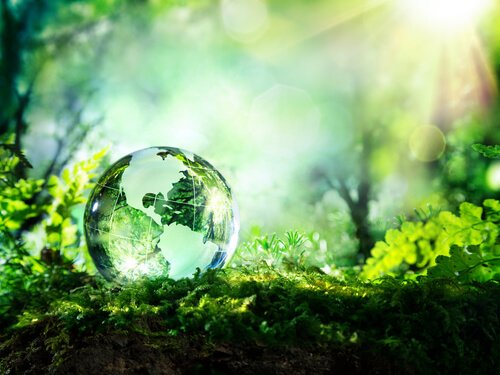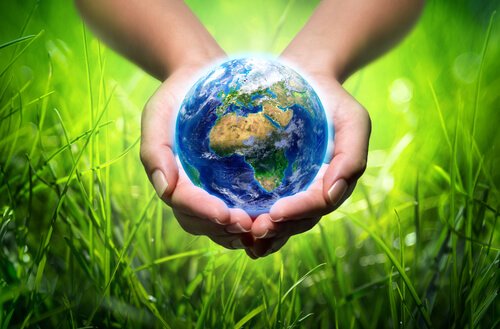Ecological Intelligence, A Bid to Save Nature

One of the most significant challenges that our society faces is the human race’s dramatic impact on the environment. Our current lifestyles have resulted in the planet’s natural resources depleting at a phenomenal rate. The effects that we’re starting to see are just a bit of what may possibly come. What can we do to prevent this? We need to boost our ecological intelligence.
The traditional concept of intelligence had transformed into one that has much more meaning and deals with many more questions. For example, nowadays it’s quite common to hear terms such as emotional or social intelligence. One of the most recent variants of this concept is the key to reducing our impact on the environment.
This article will examine the exact meaning of ecological intelligence and how it can mediate our impact on the environment. It’ll also explore several key initiatives that will help us start boosting this intelligence through daily routines.
What’s Ecological Intelligence?
In 2009, Daniel Goleman (author of works on “emotional intelligence”) put forward a new concept that has since become very significant in certain psychological fields. This concept is ecological intelligence, which, according to Goleman, is centered on the ability to understand the impact of our actions on the environment.

This suggests that someone with a low ecological intelligence will have a very poor understanding of the consequences of their actions on the environment, as well as a limited ability to change their behavior as a result of these consequences. This person wouldn’t recycle or would overuse water, for example.
Therefore, Goleman proposes that we should start thinking more carefully about the impact of our actions. According to the author, every small gesture makes a difference. Buying organic products or clothing made from recycled materials can help reduce our “environmental footprint”, ensuring that our existence doesn’t threaten the long-term survival of our planet.
“Simply recycling isn’t enough. Neither is buying organic food, nor changing light bulbs or switching off wall sockets… These steps are essential, but not enough, as what we really need to do is change our way of thinking. All our actions have an impact on the environment: we would be ignorant to deny that.”
-Daniel Goleman-
How to Develop Your Ecological Intelligence
According to Goleman, we’re no longer able to understand the impact we have on the world around us. As we’ve become immersed in a consumer culture that has drawn its curtains on the world, we’re unable to see how our actions affect nature. This wasn’t an issue in past centuries, when people lived and worked on the land. In those times, everyone was aware that our survival depended on nature.
The issue of low ecological intelligence is a double-edged sword. On one hand, the negative effects that we have on the planet are multiplying at an alarming rate. However, the issue goes further than that. Our own mental health is suffering due to the unnatural world in which we’re developing. Several studies have shown that the more disconnected we become from the natural world, the more likely we are to suffer from issues such as anxiety and depression.
If we want to live a happy and sustainable life, it’s important for us to make a conscious effort to boost our ecological intelligence. But how can we do this?
The Solution: Increase Your Awareness
The first action we should take to improve our ecological intelligence is to gather as much information as possible on our impact on the environment. For various reasons, most of us aren’t aware of our lifestyles’ environmental impact. We don’t know how much it costs to produce the food we eat, the clothing we buy, or to upkeep our homes or our cars.
Therefore, the first step in developing our intelligence is to become more aware of what we do. This means considering the small decisions we make on a daily basis and how they affect our world and society. Do you travel to work by car or by train? Do you purchase organic food or do you go to a traditional supermarket?

Simply put, educating ourselves on the way in which our modern habits influence nature, and reflecting on those habits, will allow us to start developing our ecological intelligence.
The next step is, of course, a little more difficult. Unless our habits are already faultless, we’ll need to start making them more sustainable. This could take years and require us to completely transform our lifestyles. However, the rewards are unparalleled. We’ll manage to create a better world for future generations to enjoy.
One of the most significant challenges that our society faces is the human race’s dramatic impact on the environment. Our current lifestyles have resulted in the planet’s natural resources depleting at a phenomenal rate. The effects that we’re starting to see are just a bit of what may possibly come. What can we do to prevent this? We need to boost our ecological intelligence.
The traditional concept of intelligence had transformed into one that has much more meaning and deals with many more questions. For example, nowadays it’s quite common to hear terms such as emotional or social intelligence. One of the most recent variants of this concept is the key to reducing our impact on the environment.
This article will examine the exact meaning of ecological intelligence and how it can mediate our impact on the environment. It’ll also explore several key initiatives that will help us start boosting this intelligence through daily routines.
What’s Ecological Intelligence?
In 2009, Daniel Goleman (author of works on “emotional intelligence”) put forward a new concept that has since become very significant in certain psychological fields. This concept is ecological intelligence, which, according to Goleman, is centered on the ability to understand the impact of our actions on the environment.

This suggests that someone with a low ecological intelligence will have a very poor understanding of the consequences of their actions on the environment, as well as a limited ability to change their behavior as a result of these consequences. This person wouldn’t recycle or would overuse water, for example.
Therefore, Goleman proposes that we should start thinking more carefully about the impact of our actions. According to the author, every small gesture makes a difference. Buying organic products or clothing made from recycled materials can help reduce our “environmental footprint”, ensuring that our existence doesn’t threaten the long-term survival of our planet.
“Simply recycling isn’t enough. Neither is buying organic food, nor changing light bulbs or switching off wall sockets… These steps are essential, but not enough, as what we really need to do is change our way of thinking. All our actions have an impact on the environment: we would be ignorant to deny that.”
-Daniel Goleman-
How to Develop Your Ecological Intelligence
According to Goleman, we’re no longer able to understand the impact we have on the world around us. As we’ve become immersed in a consumer culture that has drawn its curtains on the world, we’re unable to see how our actions affect nature. This wasn’t an issue in past centuries, when people lived and worked on the land. In those times, everyone was aware that our survival depended on nature.
The issue of low ecological intelligence is a double-edged sword. On one hand, the negative effects that we have on the planet are multiplying at an alarming rate. However, the issue goes further than that. Our own mental health is suffering due to the unnatural world in which we’re developing. Several studies have shown that the more disconnected we become from the natural world, the more likely we are to suffer from issues such as anxiety and depression.
If we want to live a happy and sustainable life, it’s important for us to make a conscious effort to boost our ecological intelligence. But how can we do this?
The Solution: Increase Your Awareness
The first action we should take to improve our ecological intelligence is to gather as much information as possible on our impact on the environment. For various reasons, most of us aren’t aware of our lifestyles’ environmental impact. We don’t know how much it costs to produce the food we eat, the clothing we buy, or to upkeep our homes or our cars.
Therefore, the first step in developing our intelligence is to become more aware of what we do. This means considering the small decisions we make on a daily basis and how they affect our world and society. Do you travel to work by car or by train? Do you purchase organic food or do you go to a traditional supermarket?

Simply put, educating ourselves on the way in which our modern habits influence nature, and reflecting on those habits, will allow us to start developing our ecological intelligence.
The next step is, of course, a little more difficult. Unless our habits are already faultless, we’ll need to start making them more sustainable. This could take years and require us to completely transform our lifestyles. However, the rewards are unparalleled. We’ll manage to create a better world for future generations to enjoy.
This text is provided for informational purposes only and does not replace consultation with a professional. If in doubt, consult your specialist.







